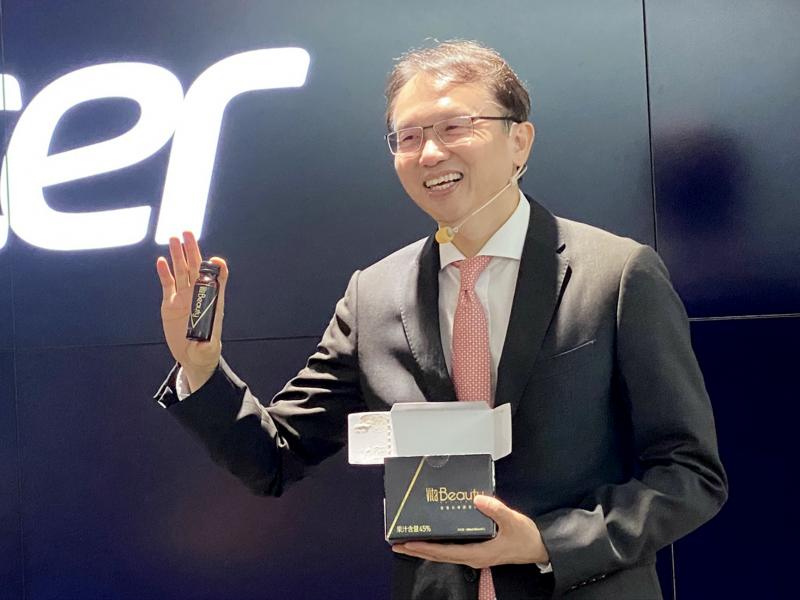Acer Inc (宏碁) yesterday said it is aiming to become a lifestyle brand following the launch of new energy drink in a livestream on Tuesday night.
The beverage, called Predator Shot, is perhaps one of the computer company’s most surprising attempts in expanding the Predator gaming line.
Seeking to repackage Acer as a lifestyle brand, the company has announced several accessories vaguely related to PCs, including a gaming inspired massage chair in collaboration with Singapore’s OSIM International Ltd (傲勝國際) and a sling bag sporting the green Acer logo.

Photo: CNA
“Our energy drink will help boost gamers’ energy and reduce fatigue resulting from too much screen time,” Acer chairman and CEO Jason Chen (陳俊聖) told a news conference at the company’s headquarters in New Taipei City, while also unveiling a collagen drink that targets female gamers.
Citing a saturated market, Chen said the company has to seek new growth beyond the PC industry.
“Forty years ago it [the PC industry] is considered a high-tech industry, but now it is no longer the case,” Chen said
“We cannot [afford to] stay in such a mature market and expect things to get better,” he added.
Still, Acer has witnessed a boom this quarter as sales over the past two months surged on the back of robust demand fostered by the growing trend for distance learning and work-from-home due to the COVID-19 pandemic.
With orders throughout the fall remaining high, the company is optimistic about its PC business in the second half of the year.
“[The increase] in demand from distance learning is phenomenal... We are having trouble satisfying up to one-third of our orders,” Acer cochief operating officer and president of corporate marketing, business planning and operations Tiffany Huang (黃資婷) said.
The imbalance between supply and demand is compounded by persistent supply chain disruptions across the PC industry, Huang said.
“As some countries remain under lockdown, some plants are unable to resume production... The delay of one component can lead to another,” she said, adding that the company is talking with suppliers to resolve shortages of components and raw materials.
China is set to become the largest growth driver for the company this year.
“Due to our relatively small presence on the Chinese market and the country’s early recovery [from the pandemic], we believe it holds great potential,” Huang said, adding that Acer is witnessing a growth rate higher than the PC industry’s average.
However, Acer’s performance in other countries across the Asia-Pacific region — including India and Indonesia — might be affected by continuous strict COVID-19 containment measures.
Last year, India and Indonesia accounted for about 25 percent of the company’s sales in the region.
Demand from the European and US markets is expected to continue on an upward trend due to their relatively rapid online migrations, the company said.

Vincent Wei led fellow Singaporean farmers around an empty Malaysian plot, laying out plans for a greenhouse and rows of leafy vegetables. What he pitched was not just space for crops, but a lifeline for growers struggling to make ends meet in a city-state with high prices and little vacant land. The future agriculture hub is part of a joint special economic zone launched last year by the two neighbors, expected to cost US$123 million and produce 10,000 tonnes of fresh produce annually. It is attracting Singaporean farmers with promises of cheaper land, labor and energy just over the border.

US actor Matthew McConaughey has filed recordings of his image and voice with US patent authorities to protect them from unauthorized usage by artificial intelligence (AI) platforms, a representative said earlier this week. Several video clips and audio recordings were registered by the commercial arm of the Just Keep Livin’ Foundation, a non-profit created by the Oscar-winning actor and his wife, Camila, according to the US Patent and Trademark Office database. Many artists are increasingly concerned about the uncontrolled use of their image via generative AI since the rollout of ChatGPT and other AI-powered tools. Several US states have adopted

A proposed billionaires’ tax in California has ignited a political uproar in Silicon Valley, with tech titans threatening to leave the state while California Governor Gavin Newsom of the Democratic Party maneuvers to defeat a levy that he fears would lead to an exodus of wealth. A technology mecca, California has more billionaires than any other US state — a few hundred, by some estimates. About half its personal income tax revenue, a financial backbone in the nearly US$350 billion budget, comes from the top 1 percent of earners. A large healthcare union is attempting to place a proposal before

Nvidia Corp’s GB300 platform is expected to account for 70 to 80 percent of global artificial intelligence (AI) server rack shipments this year, while adoption of its next-generation Vera Rubin 200 platform is to gradually gain momentum after the third quarter of the year, TrendForce Corp (集邦科技) said. Servers based on Nvidia’s GB300 chips entered mass production last quarter and they are expected to become the mainstay models for Taiwanese server manufacturers this year, Trendforce analyst Frank Kung (龔明德) said in an interview. This year is expected to be a breakout year for AI servers based on a variety of chips, as